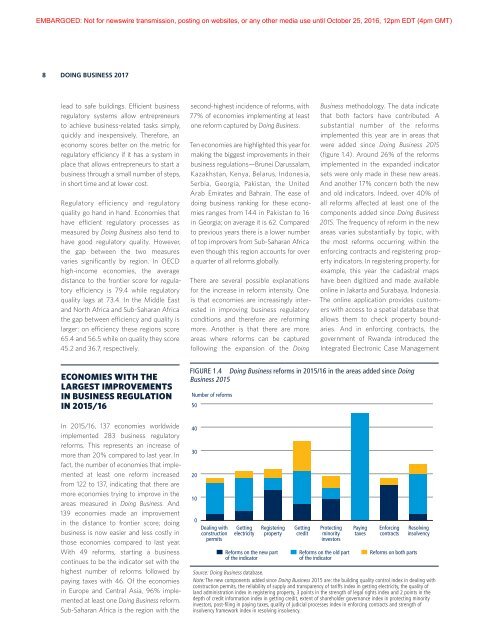49709doing-worldbank
49709doing-worldbank
49709doing-worldbank
Create successful ePaper yourself
Turn your PDF publications into a flip-book with our unique Google optimized e-Paper software.
EMBARGOED: Not for newswire transmission, posting on websites, or any other media use until October 25, 2016, 12pm EDT (4pm GMT)<br />
8<br />
DOING BUSINESS 2017<br />
lead to safe buildings. Efficient business<br />
regulatory systems allow entrepreneurs<br />
to achieve business-related tasks simply,<br />
quickly and inexpensively. Therefore, an<br />
economy scores better on the metric for<br />
regulatory efficiency if it has a system in<br />
place that allows entrepreneurs to start a<br />
business through a small number of steps,<br />
in short time and at lower cost.<br />
Regulatory efficiency and regulatory<br />
quality go hand in hand. Economies that<br />
have efficient regulatory processes as<br />
measured by Doing Business also tend to<br />
have good regulatory quality. However,<br />
the gap between the two measures<br />
varies significantly by region. In OECD<br />
high-income economies, the average<br />
distance to the frontier score for regulatory<br />
efficiency is 79.4 while regulatory<br />
quality lags at 73.4. In the Middle East<br />
and North Africa and Sub-Saharan Africa<br />
the gap between efficiency and quality is<br />
larger: on efficiency these regions score<br />
65.4 and 56.5 while on quality they score<br />
45.2 and 36.7, respectively.<br />
second-highest incidence of reforms, with<br />
77% of economies implementing at least<br />
one reform captured by Doing Business.<br />
Ten economies are highlighted this year for<br />
making the biggest improvements in their<br />
business regulations—Brunei Darussalam,<br />
Kazakhstan, Kenya, Belarus, Indonesia,<br />
Serbia, Georgia, Pakistan, the United<br />
Arab Emirates and Bahrain. The ease of<br />
doing business ranking for these economies<br />
ranges from 144 in Pakistan to 16<br />
in Georgia; on average it is 62. Compared<br />
to previous years there is a lower number<br />
of top improvers from Sub-Saharan Africa<br />
even though this region accounts for over<br />
a quarter of all reforms globally.<br />
There are several possible explanations<br />
for the increase in reform intensity. One<br />
is that economies are increasingly interested<br />
in improving business regulatory<br />
conditions and therefore are reforming<br />
more. Another is that there are more<br />
areas where reforms can be captured<br />
following the expansion of the Doing<br />
Business methodology. The data indicate<br />
that both factors have contributed. A<br />
substantial number of the reforms<br />
implemented this year are in areas that<br />
were added since Doing Business 2015<br />
(figure 1.4). Around 26% of the reforms<br />
implemented in the expanded indicator<br />
sets were only made in these new areas.<br />
And another 17% concern both the new<br />
and old indicators. Indeed, over 40% of<br />
all reforms affected at least one of the<br />
components added since Doing Business<br />
2015. The frequency of reform in the new<br />
areas varies substantially by topic, with<br />
the most reforms occurring within the<br />
enforcing contracts and registering property<br />
indicators. In registering property, for<br />
example, this year the cadastral maps<br />
have been digitized and made available<br />
online in Jakarta and Surabaya, Indonesia.<br />
The online application provides customers<br />
with access to a spatial database that<br />
allows them to check property boundaries.<br />
And in enforcing contracts, the<br />
government of Rwanda introduced the<br />
Integrated Electronic Case Management<br />
ECONOMIES WITH THE<br />
LARGEST IMPROVEMENTS<br />
IN BUSINESS REGULATION<br />
IN 2015/16<br />
In 2015/16, 137 economies worldwide<br />
implemented 283 business regulatory<br />
reforms. This represents an increase of<br />
more than 20% compared to last year. In<br />
fact, the number of economies that implemented<br />
at least one reform increased<br />
from 122 to 137, indicating that there are<br />
more economies trying to improve in the<br />
areas measured in Doing Business. And<br />
139 economies made an improvement<br />
in the distance to frontier score; doing<br />
business is now easier and less costly in<br />
those economies compared to last year.<br />
With 49 reforms, starting a business<br />
continues to be the indicator set with the<br />
highest number of reforms followed by<br />
paying taxes with 46. Of the economies<br />
in Europe and Central Asia, 96% implemented<br />
at least one Doing Business reform.<br />
Sub-Saharan Africa is the region with the<br />
FIGURE 1.4 Doing Business reforms in 2015/16 in the areas added since Doing<br />
Business 2015<br />
Number of reforms<br />
50<br />
40<br />
30<br />
20<br />
10<br />
0<br />
Dealing with<br />
construction<br />
permits<br />
Getting<br />
electricity<br />
Registering<br />
property<br />
Reforms on the new part<br />
of the indicator<br />
Getting<br />
credit<br />
Protecting<br />
minority<br />
investors<br />
Reforms on the old part<br />
of the indicator<br />
Paying<br />
taxes<br />
Enforcing<br />
contracts<br />
Reforms on both parts<br />
Resolving<br />
insolvency<br />
Source: Doing Business database.<br />
Note: The new components added since Doing Business 2015 are: the building quality control index in dealing with<br />
construction permits, the reliability of supply and transparency of tariffs index in getting electricity, the quality of<br />
land administration index in registering property, 3 points in the strength of legal rights index and 2 points in the<br />
depth of credit information index in getting credit, extent of shareholder governance index in protecting minority<br />
investors, post-filing in paying taxes, quality of judicial processes index in enforcing contracts and strength of<br />
insolvency framework index in resolving insolvency.


